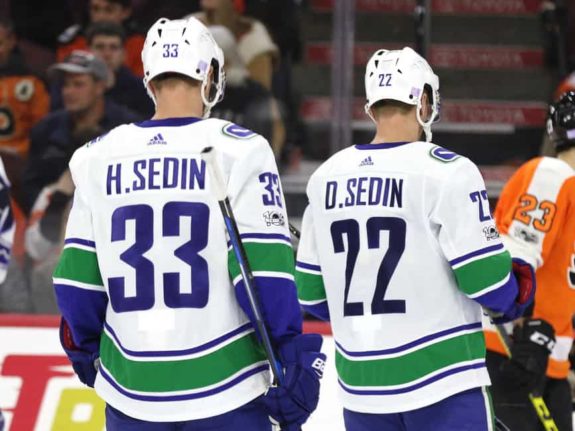There are many skills that a hockey player can have to make them an asset in the NHL. But you cannot win games without the puck hitting the back of the net, so there’s a reason that goal scorers have almost always been the most celebrated superstars during every era.
In this article, we will take a look at each franchise’s greatest goal scorer. This will not be a subjective list, merely a look at each franchise’s career goals leader. We’ll talk about the players’ arrival with and, if necessary, departure from the team, their career accomplishments, their current status, and other topics as appropriate. We will discuss each team in alphabetical order, so without further ado, let’s get started!
Anaheim Ducks — Teemu Selanne (457)
When the name Teemu Selanne comes up, the Anaheim Ducks immediately come to mind. But it was actually the Winnipeg Jets, not the Ducks, who first drafted the “Finnish Flash” 10th overall in 1988. It was there where Selanne had his record-breaking rookie season, leading the league with 76 goals. But it was in Anaheim where Selanne built the bulk of his Hockey Hall of Fame career. General manager Jack Ferreira rewrote the future of the franchise by acquiring Selanne for Chad Kilger and Oleg Tverdovsky in Feb. 1996.
Selanne would become the face of the Ducks, scoring 457 goals in two long Orange County stints totaling 966 games. Those stints were interrupted by brief periods with the San Jose Sharks and the Colorado Avalanche. In the 1998-99 season, Selanne won the inaugural Maurice “Rocket” Richard Trophy with 47 goals. Returning to Anaheim for the 2005-06 season, he won the Bill Masterton Trophy. In total, Selanne had 684 goals and 1,457 points in 1,451 career games. He retired with the Ducks at the age of 43 after the 2013-14 season. He entered the Hockey Hall of Fame in 2017.
Arizona Coyotes — Shane Doan (402)
Shane Doan spent his entire career with the franchise that drafted him seventh overall in 1995. But after his rookie season, that franchise moved over 1,800 miles from Winnipeg to Phoenix, Arizona. There, with the Coyotes, Doan played 20 more seasons. From 2003 to 2017, he served as the franchise’s captain.

Doan played 1,540 total career games, with 972 points. He won the King Clancy Memorial Trophy in the 2009-10 season, and the Mark Messier Leadership Award in 2011-12, as well as three World Championship silver medals and two golds. But the Stanley Cup eluded him. Doan retired after the 2016-17 season, and the Coyotes retired his #19 just over a year later.
Boston Bruins — John Bucyk (545)
For all the great players in recent years for the Boston Bruins, the greatest goal-scorer, statistically speaking, played during their heyday in the 60s and 70s. John Bucyk arrived in Boston amidst some controversy, as the Bruins traded the beleaguered Terry Sawchuk back to the Detroit Red Wings to acquire the young forward.
All Bucyk did from there on out was score, tallying his 545 goals in 1,436 games with the Bruins. As he aged, he helped win the Stanley Cup in 1970 and 1972, and he grabbed a Lady Byng Trophy for his personal trophy case for the 1970-71 season and the 1973-74 season. He retired at 42 after the 1977-78 season, with 1,369 points in 1,540 total games. The Bruins retired his #9 and the Hockey Hall of Fame inducted him in 1981.
Buffalo Sabres — Gilbert Perreault (512)
Gilbert Perrault was a career Buffalo Sabre. The team drafted him first overall in the 1970 NHL Draft, their inaugural draft. It turns out the first-ever Sabre may have been the best, too. Perreault won the Calder Trophy as a rookie, and also collected a Lady Byng in the 1972-73 season. The two-time All-Star collected 1,326 points in his 1,191 game career, centering the prolific French Connection with Richard Martin and Rene Robert. He retired in 1987 at 36. The first-ever Sabres draft pick became the first-ever retired number (#11) and joined the Hall of Fame in 1990.
Calgary Flames — Jarome Iginla (525)
Jarome Iginla is so synonymous with the Calgary Flames, it might surprise some readers that they were not the team that drafted him. In fact, the Dallas Stars took Iginla 11th overall in the 1995 Draft before trading him to Calgary in exchange for Joe Nieuwendyk in Dec. 1995. Nieuwendyk continued his Hall of Fame career in Dallas and helped them win a Cup. But the Flames did perfectly alright in the trade.
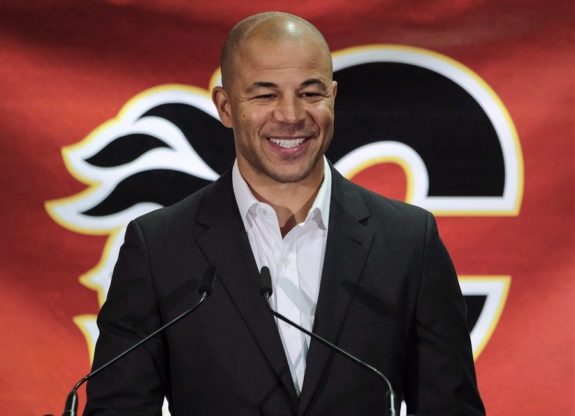
Though Iginla never won the Stanley Cup, he accomplished practically everything else in his career. He was an All-Star four times, he won the Art Ross Trophy, the Maurice “Rocket” Richard Trophy, and the Lester B. Pearson Award for his 96 points 2001-02 season. He won another Richard, the King Clancy, and the Mark Messier Leadership Award later in his career.
Iginla departed Calgary for the Pittsburgh Penguins in pursuit of the Cup, playing for several more teams in his career. He formally announced his retirement in 2018, finishing with exactly 1,300 points (1,095 with the Flames) and 1,554 games (1,219 with the Flames). In Mar. 2019, the Flames retired his number 12. He is not yet eligible for the Hockey Hall of Fame.
Carolina Hurricanes — Ron Francis (382)
Ron Francis, affectionately known as “Ronny Franchise,” was certainly that in the history of the Carolina Hurricanes/Hartford Whalers organization. The Whalers drafted him fourth overall in 1981, and he played the first nine and a half seasons of his career there. He then moved to the Penguins — where he would win most of his hardware — in a trade that would transform that franchise. There, he won back-to-back Stanley Cups in 1991 and 1992. He’d also win a Lady Byng Trophy in both 1995 and 1998, and a Selke Trophy as well in 1995, becoming the first Penguin to win it.
Francis returned to the franchise that drafted him as a free agent, but by this point, they’d relocated to Carolina. He played 472 more games there, tallying 118 goals in that time. He’d retire (after a very brief stint with the Toronto Maple Leafs) in 2004 with a total of 1,731 games that ranks fourth all-time in the league. He had 1,738 points (fifth all-time) and joined the Hockey Hall of Fame in 2007.
Honorable Mention: Eric Staal
While Francis scored 60 more goals for the franchise than Eric Staal, only 118 of Francis’s came in Carolina. Conversely, Staal, whom the Hurricanes selected second overall in 2003, scored the first 322 goals of his career in Raleigh. In the final year of his contract with a rebuilding franchise, Staal went to the New York Rangers via trade during the 2015-16 season. Since then, he’s laid down roots with the Minnesota Wild and has an additional 111 goals with that franchise.
Chicago Blackhawks — Bobby Hull (604)
There is only one father/son duo on this list and the Chicago Blackhawks’ Bobby Hull was the father. Also known as “The Golden Jet,” he was one of the early great skaters in the history of the game. Hull played the first 15 years of his career in Chicago, collecting 1,153 points in 1,036 games. He won two Hart Trophies (1964-65 and 1965-66), three Art Ross Trophies (1959-60, 1961-62, 1965-66), and a Lady Byng Trophy (1964-65) with the Black Hawks, as they were then known.

The NHL was forced to restrict blade curvature because of the popularity of players emulating Hull’s style, in a ruling referred to colloquially as the “Bobby Hull rule.” Hull ultimately left the Black Hawks in pursuit of more money in the upstart World Hockey Association (WHA) with the Winnipeg Jets. He played 27 more NHL games at the end of his career during the 1979-80 season, retiring thereafter. He joined the Hockey Hall of Fame in 1983.
Colorado Avalanche — Joe Sakic (625)
Though he played in two cities, Joe Sakic only ever played for one franchise. The Quebec Nordiques became the Colorado Avalanche entering the 1995-96 season, at which point the 1987 15th overall pick already had 234 goals in his career. He’d add 391 in Denver, as well as Stanley Cups in the inaugural season and again in the 2000-01 season. The first of those two playoff campaigns also earned him the Conn Smythe Trophy.
During the second Cup season, in which Sakic scored 118 points in 82 games, he earned the Lady Byng and the Hart Trophy and the Pearson Award. He retired after a number of injuries during the 2008-09 season. Prior to the following season opener, the franchise retired his #19 with a C on his banner (having been to that point the only captain in Avalanche history, taking the honor with the Nordiques in 1992-93). He was inducted into the Hockey Hall of Fame in 2012.
Honorable Mention: Milan Hejduk
Distinct from some other relocated franchises on this list, Sakic scored the most goals of any Avalanche player playing in Colorado, even without his time in Quebec City. But Milan Hejduk deserves recognition for the 375 goals he scored playing exclusively with the Avalanche. He was a Quebec draftee in 1994 but didn’t begin his career until the 1998-99 season. He won the Richard Trophy in 2002-03, and retired in 2012-13 with 805 points and 1,020 career games.
Columbus Blue Jackets — Rick Nash (289)
The Columbus Blue Jackets are a relatively young team, but there’s no debating the greatest player in franchise history to this point. Rick Nash was the first overall pick in the 2002 NHL Draft, and he’d play the next nine years with the Blue Jackets.

In that time, he scored 289 goals and 547 points in 674 games with the franchise. In his sophomore season in 2003-04, he won the Richard Trophy with 41 goals. After nine seasons, Nash was clearly the biggest trade chip for a rebuilding franchise, and he was shipped to the Rangers for a haul of players and a first-round pick.
Dallas Stars — Mike Modano (557)
Like Sakic, Modano also began his career in a different city than he became most famous in, as it was the Minnesota North Stars who drafted him first overall in 1988, just the second American ever to be taken with that pick. He would go on to become one of the greatest American hockey players ever. He finished second in the Calder Trophy race with his 75 point rookie season. When the Stars relocated to Dallas after three more seasons, Modano already had 123 goals.
Modano wouldn’t miss a beat in the Lone Star State, and he became a critical player in popularizing the game in the American South. Though his career was devoid of any individual silverware, he helped the Stars win the Stanley Cup in 1999.
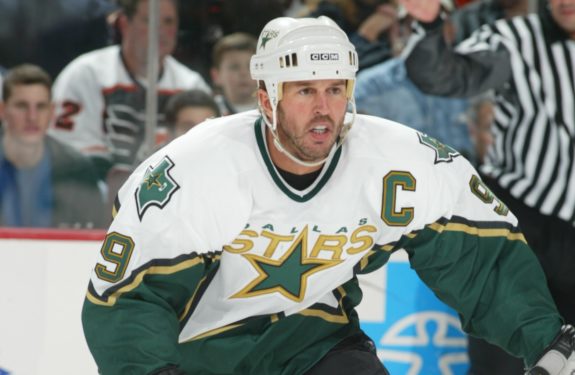
He finished his career in Dallas after the 2009-10 season with 1,050 points (434 goals) in 1,142 games, in addition to the 309 points in the 317 games he’d played in Minnesota. He played 40 more games with the Detroit Red Wings, retiring at 1,499, a missed milestone most attribute to the interference of head coach Mike Babcock. He joined the Hockey Hall of Fame in 2014 and returned to Minnesota to join the Wild’s front office in 2019.
Detroit Red Wings — Gordie Howe (786)
It’s no surprise who leads the Detroit Red Wings franchise in goals, as the legendary “Mr. Hockey” played all but 80 of his 1,767 games in the NHL in the Motor City. During that time he scored 786 goals, adding 15 with the Hartford Whalers at the age of 51 for a total of 801 that is second in NHL history.
We do not have the space to give a comprehensive recap of Howe’s incredible career, but he would retire after the 1979-80 season with the Hartford Whalers having won four Stanley Cups, six Hart Trophies, and six Art Ross Trophies. He was a 21-time All-Star and was remarkably inducted into the Hockey Hall of Fame in 1972, almost a decade before his official retirement. He is a legend in every sense of the word.
Edmonton Oilers — Wayne Gretzky (583)
It is ironic that the next team alphabetically after Howe’s Red Wings is “the Great One” Wayne Gretzky’s Edmonton Oilers. Another player whose incredible accomplishments are far too much to cover in limited space, Gretzky’s 894 career goals are an NHL record, and he scored the first 583 in Edmonton.
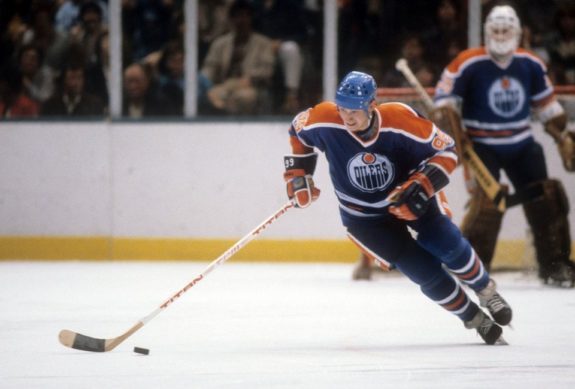
Gretzky joined the NHL with the Oilers when the team left the folding WHA, and he would leave the team in a trade to the Los Angeles Kings that shocked the hockey world. In his career he won four Stanley Cups, all with the Oilers, as well as two Conn Smythe Trophies, five Lady Byng Trophies, five Lester B. Pearson Awards, 10 Art Ross Trophies, and nine Hart Trophies. The vast majority of those also came in Edmonton.
He retired with the Rangers in 1999, having played 1,487 career NHL games with a whopping 2,857 points. He immediately joined the Hockey Hall of Fame upon retirement, the most recent player to be given the honor of a waived waiting period. Gretzky is widely considered the greatest player in the history of professional hockey, and he is synonymous with the Oilers franchise, where he now works again as a member of the front office.
Florida Panthers — Olli Jokinen (188)
Olli Jokinen’s career spanned a number of franchises, but he did his best work with the Florida Panthers from 2000 to 2008. The Kings drafted Jokinen third overall in 1997, but he struggled to produce offensively and was quickly traded to the New York Islanders. He played there only one season before being packaged with Roberto Luongo in a trade that would transform the Panthers’ future (and ruin Islanders’ general manager Mike Milbury’s reputation beyond repair).
Jokinen did not have a decorated career, but he was a perfectly capable player for the Panthers. He had 419 points in 567 games, collected 89 and 91 points in his back-to-back greatest seasons, 2005-06 and 2006-07. After another strong 2007-08 season, the Panthers traded him to the then Phoenix Coyotes for Keith Ballard and other pieces. Jokinen retired in 2015 after several more NHL stops. Aleksander Barkov will soon break Jokinen’s franchise record, as he currently sits at 155 goals.
Los Angeles Kings — Luc Robitaille (557)
Luc Robitaille is by far best known for his fourteen seasons with the Kings, but those seasons actually came in three stints. The Kings drafted the Montreal native in the ninth round (171st overall) in 1984. But he progressed to the NHL quickly, winning a Calder Trophy for his 84 point rookie season in 1986-87. He played in Los Angeles through the 1993-94 season, whereafter the Kings traded him to the Penguins. Several seasons later, the Kings reacquired Robitaille from the Rangers.
He played there four more seasons, then signed with the Red Wings prior to the 2001-02 season, hoping to claim his first career Stanley Cup. That he did the same season. When the two-year contract ended, he returned once again to Los Angeles where he would play the final two seasons of his career (ending with the 2005-06 season).
Robitaille was an eight-time All-Star in addition to his Calder Trophy and his Stanley Cup. When he retired, he had 1,431 games and 1,394 points, the highest-scoring left winger in NHL history. He joined the Hockey Hall of Fame when first eligible in 2009. Since his retirement, he has served in the Kings’ front office, playing a critical role in building the team that won the franchise’s first two Stanley Cups in 2011-12 and 2013-14.
Minnesota Wild — Marian Gaborik (219)
As terrific a player as Marian Gaborik was, he played for five different franchises and never stuck with any one team for very long. But his longest stint was with the team that drafted him, the Wild, who took him third overall in the 2000 NHL Draft, their inaugural draft. He played eight seasons there, scoring 437 points with 219 goals in 502 games.
Gaborik left in free agency as the last original Wild player, signing with the Rangers in 2009. He would later win a Cup in 2014 with Robitaille’s Kings, before seemingly ending his career due to a herniated disk he suffered with the Ottawa Senators in 2018.
Montreal Canadiens — Maurice Richard (544)
The very fact that the “Rocket” Richard Trophy awarded to the top goal scorer every season is named after Maurice Richard says everything one needs to know about his goal-scoring acumen. A native of Montreal in the era in which he played, Richard was “property” of the Montreal Canadiens well before arriving in the NHL. That he did in the 1942-43 season. He would play 18 seasons with his hometown team, winning an unbelievable eight Stanley Cups. In that time he played 978 games, scoring 544 goals and 422 assists for 966 points.

In addition to being a 14-time All-Star, Richard won the Hart Trophy for the 1946-47 season. He retired after the 1959-60 season, serving as captain for those final four seasons, and joined the Hockey Hall of Fame the following year. It is difficult to overstate Richard’s legacy in Montreal or the greater hockey community. When he succumbed to abdominal cancer in May 2000, the province of Quebec honored him with a state funeral.
Nashville Predators — David Legwand (210)
As much success as the Nashville Predators have had in recent seasons, no one has yet matched David Legwand’s accomplishment with the team. With the second pick in the 1998 Draft, the Predators made Legwand their first-ever draftee. Though he did not have a particularly meritorious career, he played 15 seasons in the Music City, scoring 210 goals and 566 points in 956 games. At the end of a contract with the team out of contention, the Predators traded Legwand to Detroit in 2014. He finished his career after a few more stops with 1,136 games and 618 points.
New Jersey Devils — Patrik Elias (408)
The 51st overall pick in the 1994 Draft, Patrik Eliáš joined the New Jersey Devils then and would never play for another team. He was a stalwart for the franchise that went to the postseason every season from 1996 to 2010, winning Stanley Cups in 2000 and 2003. He was also an All-Star in the 2000-01 season. Eliáš isn’t remembered as an elite player, but he was as consistent as they come. He retired after the 2015-16 season with 1,240 games, 408 goals, and 1,025 points. He is the franchise leader in many offensive categories.
New York Islanders — Mike Bossy (573)
A legend in every sense of the word, Mike Bossy scored his incredible 573 goals and 1,126 points in just 10 seasons, all with the New York Islanders. The team drafted him 15th overall in the 1977 NHL Draft. He won the Calder Trophy the following season, leading the league with 25 power play goals while scoring 91 points. Later in his career, he would win three Lady Byng Trophies in four seasons from 1982-1986, missing only the 1984-85 season.
Bossy was the biggest scoring threat for the Islanders’ iconic 80s’ dynasty, and he helped the team win Stanley Cups in four consecutive seasons (1979-80 through 1982-83). Bossy is the only player to score the Stanley Cup-winning goal in back-to-back seasons (1982 and 1983). But both the Islanders’ fortunes and Bossy’s physical health declined quickly later in his career, and he officially retired after the 1987-88 season with a bad back. The Islanders retired his #22 in 1992, the year following his Hockey Hall of Fame induction.
New York Rangers — Rod Gilbert (406)
Rod Gilbert was a steady force for the Rangers during the 60s and 70s, scoring 406 goals and 1,021 points in 1,065 games over 18 seasons in the Big Apple. After surviving a terrifying injury in junior hockey, Gilbert joined the Rangers at the tail end of the 1960-61 season. Though his career wasn’t decorated with hardware, he won a Bill Masterton Trophy in 1976 for persevering through his back issues. He also played for Canada in the 1972 Summit Series. Gilbert retired after the 1977-78 season, and his #7 was the first Rangers number retired. He joined the Hockey Hall of Fame in 1982.
Ottawa Senators — Daniel Alfredsson (426)
Chris Phillips, whom the Senators drafted first overall in 1996, played 1,179 games for the franchise. Daniel Alfredsson, whom they drafted 133rd overall in 1994, played 1,178 in his career. But for that one game, Alfredsson would hold virtually ever Senators franchise record a skater could hold.
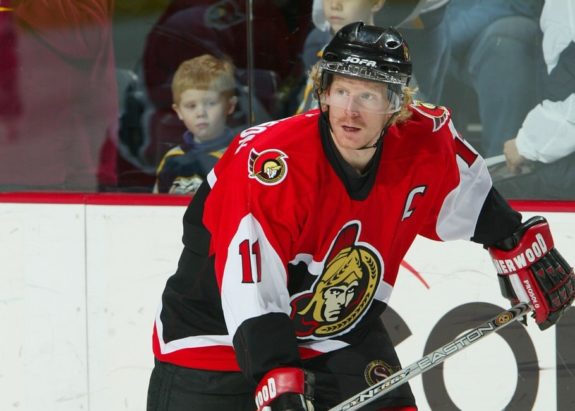
The Gothenburg, Sweden native played his first 17 seasons in Canada’s capital city, scoring 1,108 points total in that time. He won the Calder Trophy with 61 points as a rookie in 1995-96, a very quick evolution for a recent sixth-rounder. In the 2011-12 season, he won the King Clancy Memorial Trophy, and he won the Mark Messier Leadership Award the following season. He was an All-Star during the 2005-06 season.
While he wasn’t the most decorated player, and the Senators went through good and bad periods during his career, he was the heart and soul of the team, serving as captain from the 1999-00 season through the 2012-13 season. Pursuing a Stanley Cup, Alfredsson shocked his teammates by signing a one-year deal with the Red Wings for what turned out to be his final season in 2013-14. He returned to the organization to retire in 2014, and his #11 went to the rafters. Most consider Alfredsson a fringe Hockey Hall of Fame candidate.
Philadelphia Flyers — Bill Barber (420)
The Philadelphia Flyers have claimed just two Stanley Cups in their history, back-to-back in 1974 and 1975. Bill Barber was a major contributor on both teams. Drafted seventh overall in 1972, his 64-point rookie season put him second in Calder Trophy voting. He would play through the 1983-84 season, always with the Flyers, earning All-Star honors in 1975-76, 1978-79, and 1980-81.
Barber scored 883 points in 903 games before a knee injury forced his retirement. After his playing career, he had a long coaching career, winning a Jack Adams Trophy with the Flyers in the 2000-01 season. The Flyers retired his #7 on Oct. 7, 1990, shortly after his Hockey Hall of Fame induction the same year.
Pittsburgh Penguins — Mario Lemieux (690)
The first overall pick in 1984, the great Mario Lemieux played his entire 17-season career in the Steel City. Once again, this space won’t do justice for a Lemieux career retrospective. Suffice to say that “Super Mario” is one of the greatest hockey players in history scoring 1,723 points in just 915 games, he is second in all-time points per game behind just Gretzky himself.
Lemieux won the Calder Trophy in the 1984-85 season, and would go on to win three Hart Trophies, four Pearson Awards, six Art Ross Trophies, and two Conn Smythe Trophies, one each time he won the Stanley Cup. Despite overcoming cancer and several back injuries, he was still an all-time great. He retired in 1997, immediately joining the Hall of Fame. But Lemieux wasn’t done: he returned for five seasons from 2000 to 20006. Opening his home as a mentor, he paved the way directly for the Sidney Crosby era, retiring for good in 2006.
San Jose Sharks — Patrick Marleau (518)
One of the few active players in this discussion, Patrick Marleau is a Penguin at the time of this writing, traded there in pursuit of a Stanley Cup at the 2020 NHL Trade Deadline. Despite that move and a lengthier stint with the Maple Leafs, Marleau is iconic as a Shark. An iron man, he played 1,551 career games there in two stints, though the second was just half of a season.
He scored 518 goals there (562 in total), and has 1,102 points just as a Shark. Though he has no individual hardware and has won no Stanley Cups, most expect Marleau to join the Hockey Hall of Fame after his retirement. He also has a chance to break several career NHL records.
St. Louis Blues — Brett Hull (527)
Brett Hull is one of the greatest pure goal scorers in NHL history, and he is iconically tied to the St. Louis Blues franchise, even though he won his Stanley Cups in 1999 and 2002 with the Stars and Red Wings respectively. The Blues did not draft Hull, but traded for him early in his career with the Flames, considered for Calgary one of the worst trades in NHL history. Hull got to St. Louis and he didn’t stop scoring, tallying 527 goals in 744 games.
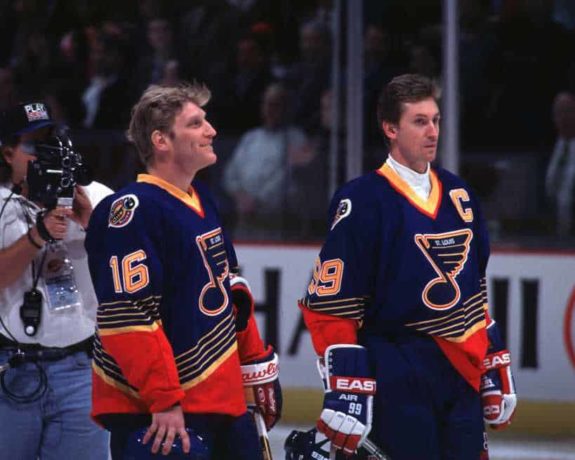
Hull’s best season was 1990-91, when he scored 86 goals and won a Hart Trophy and a Pearson Award. That season is considered the greatest era-adjusted goal-scoring season in NHL history. Hull also won a Lady Byng Trophy in the 1989-90 season. Though he left the Blues as a free agent and immediately won with Dallas, he is still a St. Louis legend. His #16 is retired by the franchise, and he still has a visible role in the organization. He joined the Hockey Hall of Fame in 2009, three years after his official retirement.
Tampa Bay Lightning — Steven Stamkos (422)
The first overall pick in the 2008 NHL Draft worked very well for the Tampa Bay Lightning. They selected Steven Stamkos of the Sarnia Sting and, despite a somewhat lackluster rookie season, he quickly became one of the most dangerous goal scorers in the league. Stamkos won a Richard trophy in his sophomore season (2009-10) and again in the 2011-12 season, tallying 60 goals that campaign. He is also a two-time All-Star. Stamkos has yet to capture the Stanley Cup, but he’s passed Vincent Lecavalier’s 383 career goal and now holds the franchise record for the Lightning.
Toronto Maple Leafs — Mats Sundin (420)
Speaking of first-overall picks, Mats Sundin became the property of the Quebec Nordiques with that selection in the 1989 Draft. But he became famous after the Maple Leafs traded a package including Wendel Clark to land him. It is arguably the best trade in Toronto history.
Sundin would play 981 games for the Maple Leafs, scoring 987 points in that time. he was also a two-time All-Star. In the 2007-08 season, which would be his last in Toronto, he won the Mark Messier Leadership Award. Thereafter, he became a free agent, and after some delay accepted a lucrative offer from the Vancouver Canucks. He played just half of one season before retiring. His #13 sweater was retired by the Maple Leafs in 2016, several years after he joined the Hockey Hall of Fame in 2012.
Vancouver Canucks — Daniel Sedin (393)
When the legendary Sedin Brothers’ careers ended in 2018, Henrik had 29 more points. But it was Daniel, younger by six minutes, who finished with substantially more goals. The pair joined the Canucks with the second and third picks in the 1999 NHL Draft in the opposite order of their birth. They would play 17 seasons together in Vancouver. Daniel won the Pearson Award and the Art Ross Trophy in 2010-11, one season after Henrik won the Ross and the Hart Trophies.
Daniel was a two-time All-Star, and also won a King Clancey Trophy in his final season, sharing it with his brother. The pair retired at the conclusion of the 2017-18 season, with Daniel scoring two goals, including the overtime winner, in their final game. The Canucks retired their numbers 22 and 33 in Feb. 2020. And while they are not yet Hockey Hall of Fame eligible, they will surely be honored there one day, and it will surely be together.
Vegas Golden Knights — William Karlsson (82)
When the Blue Jackets surrendered a haul to the Vegas Golden Knights to take William Karlsson and David Clarkson’s contract, they never could have predicted the player Karlsson would quickly become. In his first three seasons with the fledgling franchise, he has one 43-goal campaign and has 82 goals and 180 points in 227 total games. He also won the Lady Byng Trophy in the Golden Knights’ inaugural season. At the time of this writing, Karlsson holds the franchise lead over Jonathan Marchessault by just eight goals.
Washington Capitals — Alexander Ovechkin (706)
Alexander Ovechkin is believed by some to be the greatest NHL goal scorer ever, considering the era he plays in. Drafted first overall by the Washington Capitals in the 2004 NHL Draft, he’s never played for another team. He won the Calder Trophy as a rookie in the 2005-06 seasons, with 106 points. He’s led the league in goals (winning the Richard Trophy) in eight of his fourteen completed seasons so far, and looks to be on track to do it again if the 2019-20 season is resumed (or if it is canceled, for that matter).
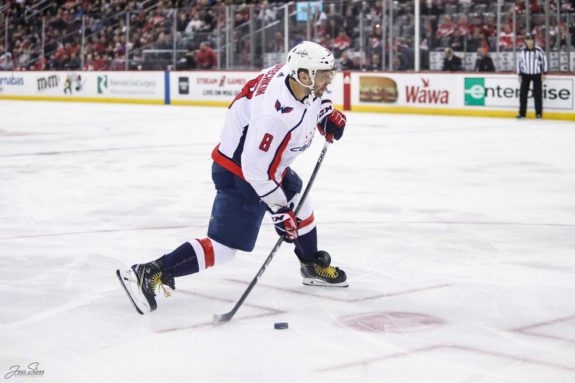
Ovechkin has never scored fewer than 32 goals in an NHL season. In addition to his eight Richard Trophies, he’s won three Hart Trophies, two back-to-back in 2008 and 2009, and a third in 2013. He has also won three Pearson Awards, all back-to-back in 2008, 2009, and 2010. He won his lone Art Ross Trophy for the 2007-08 season.
But Ovechkin’s crowning achievement was undoubtedly the Stanley Cup he helped the Capitals win in 2018, along with the Conn Smythe Trophy he added to his personal trophy cabinet. He’s equally well-remembered for the legendary celebrate afterward. It’s unknown how many years Ovechkin has remaining, but he likely has the best opportunity to break Wayne Gretzky’s career goals record that anyone ever will. In fact, the Great One is rooting for him.
Winnipeg Jets — Ilya Kovalchuk (328)
Ilya Kovalchuk is officially the franchise leader in goals for the Winnipeg Jets. But the first overall pick of the Atlanta Thrashers in 2001 left the team long before it relocated prior to the 2011-12 season. Before he did, though, he scored 328 goals and 615 assists in 594 games, winning the Richard Trophy in the 2003-04 season, becoming an All-Star during the same campaign. The Thrashers traded Kovalchuk to the Devils in 2010. He signed a massive contract, before leaving the NHL for the KHL for a period. he returned in 2018 and is still playing.
Honorable Mention: Blake Wheeler
Kovalchuk never played a game in Winnipeg, so it is only fitting to honor Blake Wheeler as the career goals leader for the reborn Jets. The Bruins surrendered Wheeler to the then-Thrashers in 2011, but he played only 23 games before they relocated. Since then, he’s been a fixture in Winnipeg and has 207 goals and 634 points in 687 games. He was an All-Star for the first time in the 2017-18 season.
Who is the Greatest of the Greatest?
There you have all 31 NHL franchise’s greatest goal scorers of all time. But who do you think is truly the greatest? Is it Gretzky? Lemieux? Ovechkin? Bossy? Let us know in the comments and let the debate begin!
